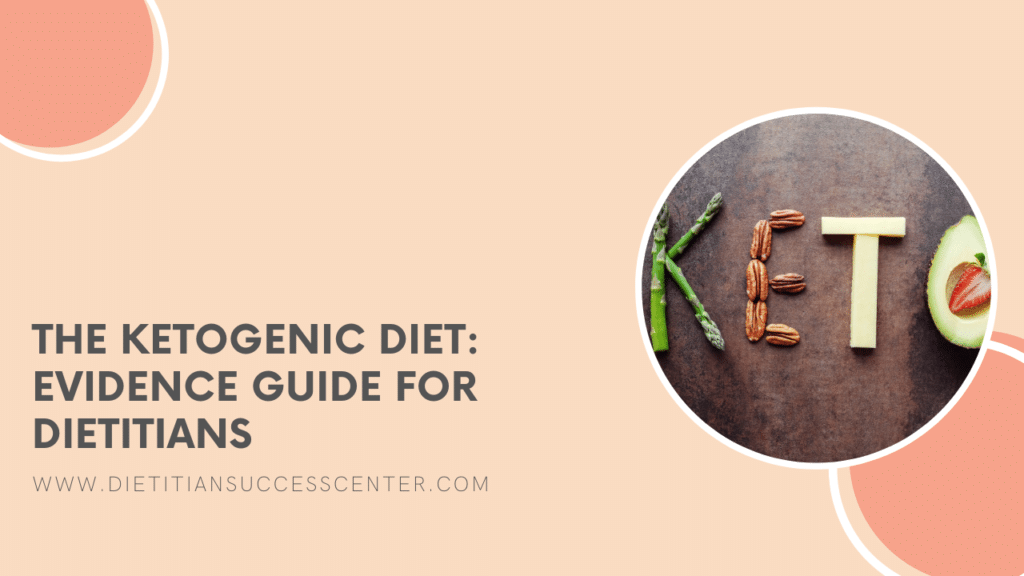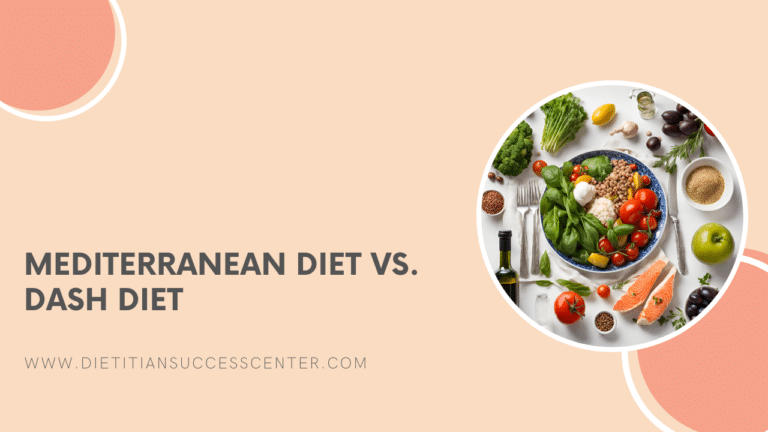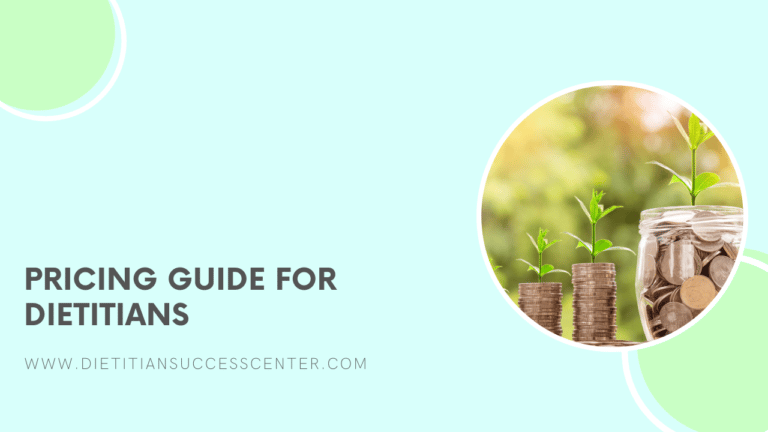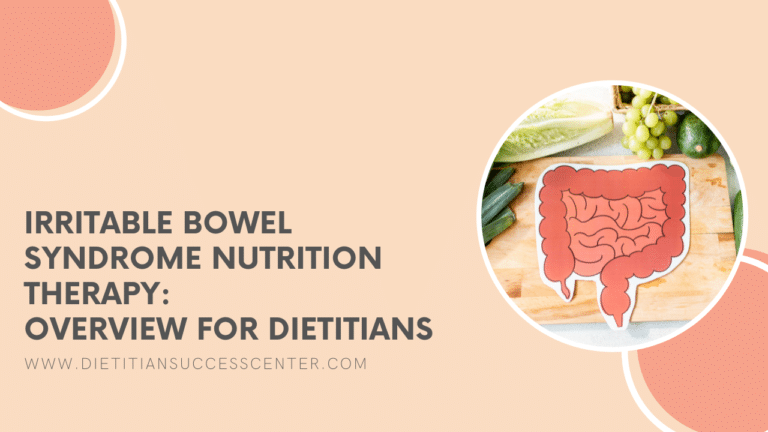

Written by Olivia Farrow, RD, MHSc
Reviewed by Krista Kolodziejzyk, RD, MPH, MBA
Are you a registered dietitian (RD) wanting to learn more about the Ketogenic Diet and how to support your clients with their nutrition goals?
In this article, we share the basics of the ketogenic diet for non-epilepsy usage and current evidence. The ketogenic diet used as a treatment for epilepsy is outside the scope of this blog article.
This article is based on DSC’s Ketogenic Diet evidence summary (for non-epilepsy use) for dietitians. Learn more about the ketogenic diet, build your expertise, and access ready-to-use resources including our keto registered dietitian SOAP note summary & Ketogenic Diet Pros & Cons handout.
What is the Ketogenic Diet?
The ketogenic diet (KD) is a high fat, moderate protein, very low carbohydrate eating pattern. It encourages the body to rely on energy from ketone bodies derived from fat, rather than glucose from carbohydrates. The diet has been advertised in recent years for weight loss, diabetes management, athletic performance, and general health (1).
The original ketogenic diet began as a treatment for epilepsy in children, which differs from the KD currently promoted for weight loss.
The macronutrient distribution range for a mainstream KD is (2):
-
- Fat: 75-80%
-
- Protein: 15-20%
-
- Carb: <10%
Typically people following low and very low carbohydrate diets tend to eat less ultra-processed foods including soft drinks, cakes, pastries, doughnuts, sweets (3,4). For this reason, the KD may promote improved diet quality in individuals with diets consisting mostly of high-carbohydrate processed foods.
Keto Diet: Dietitian Evidence Summary
Weight Loss
Statistically, the majority of individuals who try a KD are looking for weight loss benefits (5,6). The KD may result in short-term rapid weight loss (1,7,8,9). Longer-term, a KD may not be as effective for maintaining weight loss (10,11)
Overall, research suggests that the KD can induce weight loss in the short-term but future research is needed beyond 2 years.
Permanent weight loss from a diet is rare and participating in restrictive diets often leads to weight regain within 1 year (12).
Cardiovascular Health
There have been no meta-analyses of RCTs looking specifically at cardiovascular events or mortality. Overall, there seems to be a reduction of triglycerides and an increase in HDL-cholesterol alongside an increase in LDL-cholesterol. The beneficial changes to blood lipids must be weighed against the possible detrimental effects.
Diabetes
There have been some studies supporting the positive effects of KD on type 2 diabetes management including:
-
- Decline in HbA1c
-
- Improvement in glycemic control
-
- Reduction in anti-diabetic therapy
These studies have not been randomized and are only looking at short-term effects. There is a lack of data on long-term safety, adherence and efficacy.
The improved metabolic profile for diabetes and cardiovascular disease may be a direct result of weight loss, rather than KD itself (2).
Other Therapeutic Uses & Areas of Research
There is emerging but limited evidence on the potential beneficial effects of KD on (7,13,17):
-
- Metabolic syndrome
-
- PCOS
-
- Cancer
-
- Acne
-
- Neurological diseases (Alzheimer’s and Parkinson’s)
Adverse Effects & Complications
Frequently cited complications and adverse effects of KD include:
-
- Flu-like symptoms (keto flu)
-
- Headache
-
- Dizziness
-
- Fatigue
-
- Nausea
-
- Upset stomach
-
- Insomnia
-
- Halitosis (bad breath)
-
- GI issues (constipation, diarrhea)
Symptoms vary from person to person.
A KD may also lead to a low intake of certain nutrients. Ongoing nutrition assessments may be necessary to determine individual needs.
Contraindications to KD include:
-
- Type 1 diabetes
-
- Kidney disease
-
- Liver failure
-
- Pancreatitis
-
- Disorders of fat metabolism
-
- Abnormal lipid profile
Keto Registered Dietitian Key Takeaways
-
- It is effective for children with epilepsy.
-
- It may have other therapeutic uses, but more evidence is needed.
-
- Adverse effects include the keto flu, GI distress, and inadequate intakes of certain nutrients.
-
- More evidence is needed about its long-term safety.
-
- RDs can apply counseling strategies to help clients make informed decisions about KD and support them in meeting their nutritional needs utilizing a client-centered approach.
Dietitian Success Center is THE professional development resource for dietitians and dietetic students. Our mission is to make it easier for dietitians and dietetic students to build expertise. We do this through evidence-based online nutrition courses, community and ready-to-use client handouts. Plus – we give you the tools to start and grow your dietitian private practice!
References
1. Academy of Nutrition and Dietetics. “What is the Ketogenic Diet?” Last modified April 2019. https://www.eatright.org/health/weight-loss/fad-diets/what-is-the-ketogenic-diet
2. Government of Canada. “What’s the deal with the Keto diet?” Last modified December 23, 2019.https://www.canada.ca/en/department-national-defence/corporate/reports-publications/health/what-is-the-keto-diet.html
3. Shafique M, Russell S, Murdoch S, Bell JD, Guess N. Dietary intake in people consuming a low-carbohydrate diet in the UK Biobank. J Hum Nutr Diet. 2018 Apr;31(2):228-38. doi: 10.1111/jhn.12527. Epub 2017 Dec 13. Abstract available from: https://www.ncbi.nlm.nih.gov/pubmed/29235157
4. Guess N. What are people eating (and not eating) while following a low-carb diet? Jan 2, 2018. Available from: http://www.weightymatters.ca/2018/01/what-are-people-eating-and-not-eating.html
5. Dalhousie University. “Agri-Food Analytics Lab.” Date accessed February 15, 2021. https://cdn.dal.ca/content/dam/dalhousie/pdf/sites/agri-food/Keto%20Report%20Jan%2017%20EN.pdf
6. U.S. News. “We Surveyed People on the Keto Diet. Here’s What They Say.” Last modified August 6, 2020. https://health.usnews.com/wellness/articles/we-surveyed-people-on-the-keto-diet-heres-what-they-say
7. Paoli, Antonio. “Ketogenic Diet for Obesity: Friend or Foe?” International Journal of Environmental Research and Public Health 11, no. 2 (2014):2092–2107. 10.3390/ijerph110202092
8. Correa, Rafaela and Michel Cardoso de AP. “Ketogenic diets in weight loss: a systematic review under physiological and biochemical aspects of nutrition.” Revista Chilena de Nutricion 46, no. 5 (2019):606-613. http://dx.doi.org/10.4067/S0717-75182019000500606
9. Sumithran, Priya, and Joseph Proietto. “Ketogenic diets for weight loss: A review of their principles, safety and efficacy.” Obesity Research and Clinical Practice 2, no. 1 (2008):1-13.https://doi.org/10.1016/j.orcp.2007.11.003
10. Nordmann, Alain, Abigail Nordmann, Matthias Briel, and Ulrich Keller. “Effects of Low-Carbohydrate vs Low-Fat Diets on Weight Loss and Cardiovascular Risk FactorsA Meta-analysis of Randomized Controlled Trials.” JAMA Internal Medicine 166, no. 3 (2006):285-293. 10.1001/archinte.166.3.285
11. Mansoor, Nadia, Kathrine Vinknes, Marit Veierod, and Kjetil Retterstol. “Effects of low-carbohydrate diets v. low-fat diets on body weight and cardiovascular risk factors: a meta-analysis of randomised controlled trials.” British Journal of Nutrition 115, no. 3 (2015):466–479. 10.1017/S0007114515004699
12. Rothblum, E. D. (2018). Slim chance for permanent weight loss. Archives of Scientific Psychology
13. Paoli, Antonio, Alessia Rubini, Jeff Volek, and Keith Grimaldi. “Beyond weight loss: a review of the therapeutic uses of very-low-carbohydrate (ketogenic) diets.” European Journal of Clinical Nutrition 67, no. 8 (2013): 789-796. 10.1038/ejcn.2013.116
14. Bueno, Nassib Bezerra, Ingrid Sofia Vieira de Melo, Suzana Lima de Oliveira, and Terezinha da Rocha Ataide. “Very-low-carbohydrate ketogenic diet v. low-fat diet for long-term weight loss: a meta-analysis of randomised controlled trials.” British Journal of Nutrition 110, no. 7 (2013):1178–1187. 10.1017/S0007114513000548
15. Goday, Anna, Diego Bellido, Ignacio Sajoux, and Ana Crujeiras. “Short-term safety, tolerability and efficacy of a very low-calorie-ketogenic diet interventional weight loss program versus hypocaloric diet in patients with type 2 diabetes mellitus.” Nutrition & Diabetes 6, no. 9 (2016). 10.1038/nutd.2016.36.
16. Bolla, Andrea M., Amelia Caretto, Andrea Laurenzi, and Marina Scavini. “Low-Carb and Ketogenic Diets in Type 1 and Type 2 Diabetes.” Nutrients 67, no. 8 (2019):962-976. 10.3390/nu11050962
17. Kossoff EH, Zupec-Kania BA, Amark PE, Ballaban-Gil KR, Bergqvist AGC, Blackford R, et al. Optimal clinical management of children receiving the ketogenic diet: recommendations of the international ketogenic diet study group.
18. Pennsylvania Academy of Nutrition and Dietetics. “The Low Down on Keto.” Last modified April 2020. https://eatrightpa.org/members/blog/the-low-down-on-keto/
19. McClernon, Joseph, William S Yancy, Jacquelin A Elberstein, and Robert C Atkins. “The Effects of a Low‐Carbohydrate Ketogenic Diet and a Low‐Fat Diet on Mood, Hunger, and Other Self‐Reported Symptoms.” Obesity 15, no. 1 (2007):182-187. https://doi.org/10.1038/oby.2007.516
20. Watanabi, Mikiko, Dario Tucciniardi, Ilaria Ernesti, and Sabrina Basciani. “Scientific evidence underlying contraindications to the ketogenic diet: An update.” Obesity reviews 21, no. 10 (2020). https://doi.org/10.1111/obr.13053








